
William Ellery Channing was the foremost Unitarian preacher in the United States in the early nineteenth century and, along with Andrews Norton (1786–1853), one of Unitarianism's leading theologians. Channing was known for his articulate and impassioned sermons and public speeches, and as a prominent thinker in the liberal theology of the day. His religion and thought were among the chief influences on the New England Transcendentalists although he never countenanced their views, which he saw as extreme. His espousal of the developing philosophy and theology of Unitarianism was displayed especially in his "Baltimore Sermon" of May 5, 1819, given at the ordination of the theologian and educator Jared Sparks (1789–1866) as the first minister of the newly organized First Independent Church of Baltimore.

Jared Sparks was an American historian, educator, and Unitarian minister. He served as President of Harvard College from 1849 to 1853.

Sylvester Judd was a Unitarian minister and an American novelist.

FredericDan Huntington was an American clergyman and the first Protestant Episcopal bishop of the Episcopal Diocese of Central New York.
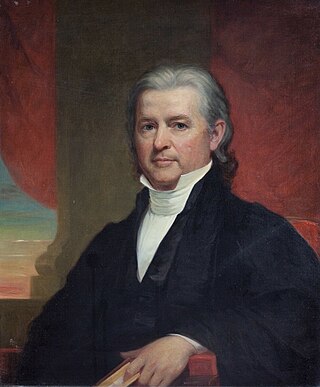
William Allen was an American biographer, scholar and academic. He served as president of both Dartmouth University and Bowdoin College.
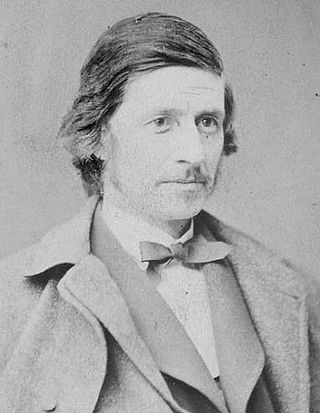
Franklin Benjamin Sanborn was an American journalist, teacher, author, reformer, and abolitionist. Sanborn was a social scientist and memorialist of American transcendentalism who wrote early biographies of many of the movement's key figures. He founded the American Social Science Association in 1865 "to treat wisely the great social problems of the day." He was a member of the so-called Secret Six, or "Committee of Six", which funded or helped obtain funding for John Brown's Raid on Harpers Ferry; in fact, he introduced Brown to the others. A recent scholar describes him as "humorless."

Samuel Longfellow was an American clergyman and hymn writer.
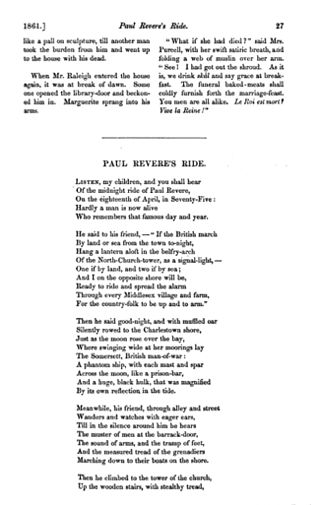
"Paul Revere's Ride" is an 1860 poem by American poet Henry Wadsworth Longfellow that commemorates the actions of American patriot Paul Revere on April 18, 1775, although with significant inaccuracies. It was first published in the January 1861 issue of The Atlantic Monthly. It was later retitled "The Landlord's Tale" in Longfellow's 1863 collection Tales of a Wayside Inn.
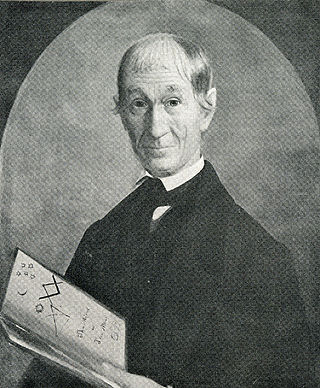
Dudley Leavitt was an American publisher. He was an early graduate of Phillips Exeter Academy in his native town of Exeter, New Hampshire, and later moved to Gilmanton where he first edited a newspaper and taught school. Within a few years, Leavitt relocated to Meredith, where in addition to teaching school and farming, he began publishing in 1797 Leavitt's Farmers Almanack, one of the nation's earliest farmers' almanacs. A polymath, Leavitt poured his knowledge of disparate fields including mathematics, language and astronomy into the wildly popular almanacs, which outlived their creator, being published until 1896. The inaugural issue of 1797 carried the title of The New England Calendar: Or, Almanack for the Year of Our Lord 1797. On the cover was the disclaimer that the new publication was "Calculated for the Meridian of Concord, Latitude 43° 14' N. Longitude 72° 45' W.: And with But Little Variation Will Answer for Any of the New England States."
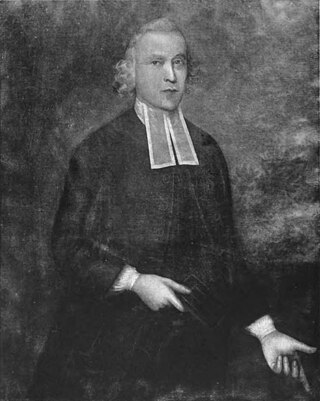
Rev. Dudley Leavitt (1720–1762) was a Congregational minister born in New Hampshire, educated at Harvard College, who led a splinter group from the First Church in Salem, Massachusetts, during a wave of religious ferment nearly a decade before the Great Awakening. Following Leavitt's death at age 42, his congregation elected to christen itself 'The Church of Which the Rev. Dudley Leavitt was late Pastor' after the charismatic preacher. Leavitt Street in Salem is named for the early minister.

Ashley Day Leavitt (1877–1959) was a Yale-educated Congregational minister who led the State Street Church in Portland, Maine, and later the Harvard Congregational Church in Brookline, Massachusetts. Leavitt was a frequent public speaker during the early twentieth century, and was awarded an honorary degree from Bowdoin College for his pastorship of several congregations during wartime.
William Mordaunt Furneaux was headmaster of Repton School and Dean of Winchester.
The State of Maine was an overnight passenger train between New York City and Portland, Maine, that was operated jointly for more than 50 years by the Boston and Maine Railroad and the New York, New Haven and Hartford Railroad. It departed New York's Pennsylvania Station at 9:00 p.m. and arrived at 6:45 a.m. at Portland's Union Station, where connections were available on Maine Central Railroad trains to most Maine locations. It ended service in October 1960, the last direct passenger rail service between New Hampshire or Maine and New York City.

The Church of Jesus Christ of Latter-day Saints in New Hampshire refers to the Church of Jesus Christ of Latter-day Saints and its members in New Hampshire.

William Bourne Oliver Peabody was a Unitarian minister and author in Springfield, Massachusetts, USA. His twin brother, Oliver William Bourne Peabody, was also a Unitarian minister at Burlington, Vermont, with identical birth and death years.

William M. Butterfield (1860–1932) was an American architect from New Hampshire.
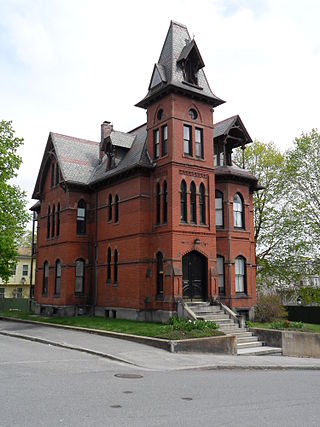
Amos P. Cutting was an American architect in practice in Worcester, Massachusetts. He entered practice in 1868 and developed a practice specializing in the design of churches and public buildings. Shortly before his death he organized the firm of Cutting, Carleton & Cutting; it maintained his specialties and outlived him by over thirty years.
Nicholas Emery was an American lawyer, politician, and judge who served as an associate justice of the Maine Supreme Judicial Court from October 22, 1834, to October 21, 1841.

William Rounseville Alger was an American Unitarian minister, author, poet, hymnist, editor, and abolitionist. He also served as Chaplain of the Massachusetts House of Representatives.
Sleeper is a surname. People with this name include:















